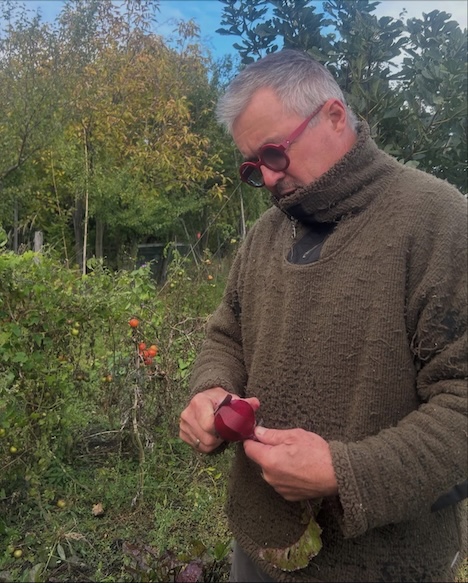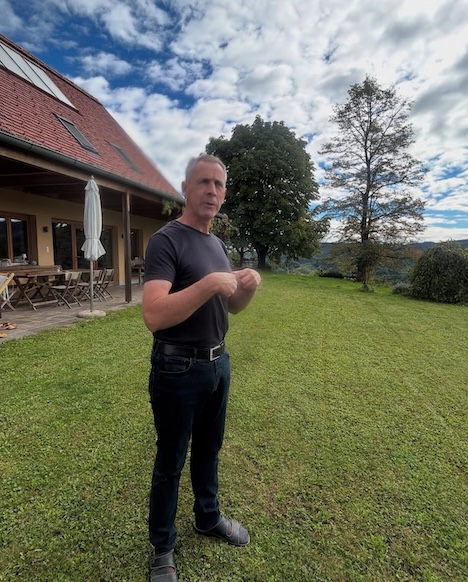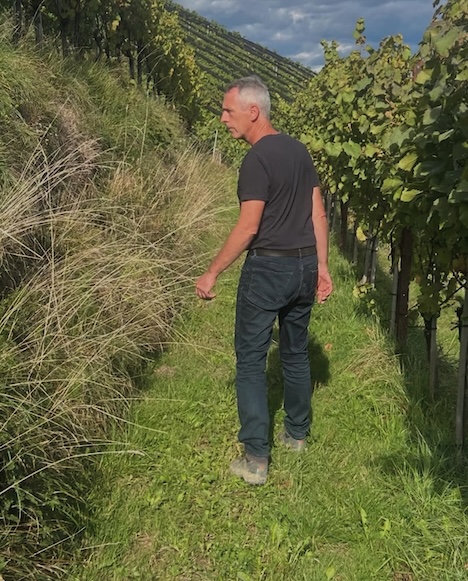“I hope your mind will explore the music and take you wherever the music takes you. It’s not a case of just singing along, it’s listening. It can be one note and that transports you somewhere. And I think if you can conjure up experiences and stories in your mind where the music takes you, to me that’s psychedelic. You have to listen to things, not just hear them.” –John Lodge
Wine is life. Rather it is part of life, life being family and community and even the food that one grows and consumes, according to Michael Andert who I visited, along with his brother Eric, in Austria last month. Michael’s definition of biodynamics is an equally all-embracing one, stating that it is natural for him to be natural (in the sense of understanding Nature and preserving her rhythms in his life and in his wines). And when you taste the wines, you understand they come from the particular person, their combined philosophy and actions, and finally the place itself – a message reinforced by a visit to and stroll through the vineyard and garden at Lerchenfeld, sampling the bounty from the ground, the bushes, and plants. Tasting nature at first hand. Then you taste the wines and truly feel where they come from.
Over the years, I have become less interested in the minutiae of wine production or forecasting what will be trendy next year, and more fixated on the actuality of the wine in the glass and how it makes me feel. I know less about wine than I used to, my professional detachment and scientific curiosity have diminished as my desire for simple (used advisedly) gratification increases. Like Michael Andert (and Andreas Tscheppe–see below) I am comfortable in following my instincts. In my case, I would rather not be encumbered with detailed knowledge as I feel that gets in the way of my tasting empathetically.
This is probably down to part laziness, part also the creeping realisation that for all the knowledge one may accrue about a wine – from digging into its vineyard origins to analysing its molecular make up – the major variable in any tasting experience is the human one. The fallible human, responsive to nuance one day, oblivious to it the next. The wine is thus not just what it is in a material sense, the object to be apprehended and evaluated for its quality – it is also the diary of my shifting moods.
Maybe not knowing too much about the wine makes me feel that I am approaching the act of tasting it in a fresher state.
If I say that I don’t like a particular wine, it is probably because its flavours disconcert my momentary preference for (a certain kind of) balance. This is not an absolute judgement on the wine in question, more recognition that my personal taste increasingly dominates my professional judgement. Some wines you get, because they align with your particular taste sensibilities and needs at a given moment, others you can appreciate without loving. I would rather love than appreciate.
The fallible human, responsive to nuance one day, oblivious to it the next. The wine is thus not just what it is in a material sense – the object to be apprehended and evaluated for its quality – it is also the diary of my shifting moods.
Tastes can change. I used to adore the aromas and flavours of decay in wines (earthy, mulchy, mushroominess), much as back then I preferred the warm russet colours of autumn, my favourite season. Now I favour the gush of the new vintage, the explosion of precocious fruit, minerals, energy and life, just as now I love the exuberance of spring. If I can change my allegiance to the seasons, then surely I can change my wine preferences!
Tasting is also, of course, the right time meets the right environment and that helps to create the right (responsive) mood.
With the Andert wines, I felt the nourishing aspect of a natural product made without anything added. Of liquid energy warming my body. Of completion. And to drink thoughtlessly, just like eating the raw veg dug from the soil or the berry plucked from a bush. Absolved from judging, one is momentarily restored to a state of uncultured appreciation.
The next day, we visit Andreas Tscheppe. The wines are different, but similar emotions are engendered. When one tastes the wines, you sense the profound connection to a particular vineyard. You visit the vineyard, and you are looped back to the wine.
When communicated, he passion of the growers is key to an enhanced experience. They are not trying to impress you or forcing their opinions on you but simply describing what they think and do. For Michael, his love for the vineyard and the garden is primal. And there is a deep respect too. Andreas is the vibrating human link in the chain, theorising, tinkering, inventing, experimenting and doing. This dancing energy is evident in the fabric of his wines.
This reminds me of Goethe’s Faust, wherein Faust is translating the famous passage from The Gospel According to John.
‘Tis written: “In the beginning was the Word!”
Here now I’m balked! Who’ll put me in accord?
It is impossible, the Word so high to prize,
I must translate it otherwise
If I am rightly by the Spirit taught.
‘Tis written: In the beginning was the Thought!
Consider well that line, the first you see,
That your pen may not write too hastily!
Is it then Thought that works, creative, hour by hour?
Thus should it stand: In the beginning was the Power!
Yet even while I write this word, I falter,
For something warns me, this too I shall alter.
The Spirit’s helping me! I see now what I need
And write assured: In the beginning was the Deed!
For Andreas (and Michael) the wines are as by-products of their happy existence in Nature, as well as liquid proof of the relationship they enjoy with their vineyards. Tasting and drinking the wines in situ is to be briefly admitted to the family and to be part of the conversations they are having with their environment.
Interested in finding more about the wines of Andert and Tscheppe? Contact us directly:
shop@lescaves.co.uk | sales@lescaves.co.uk | 01483 538820






